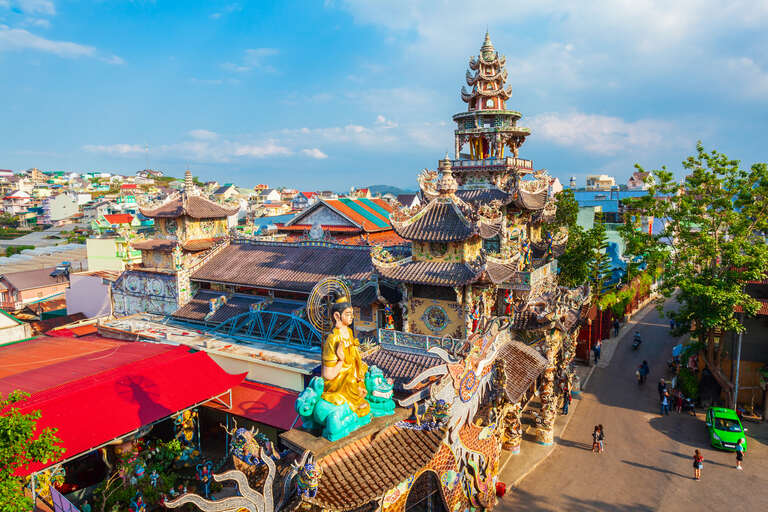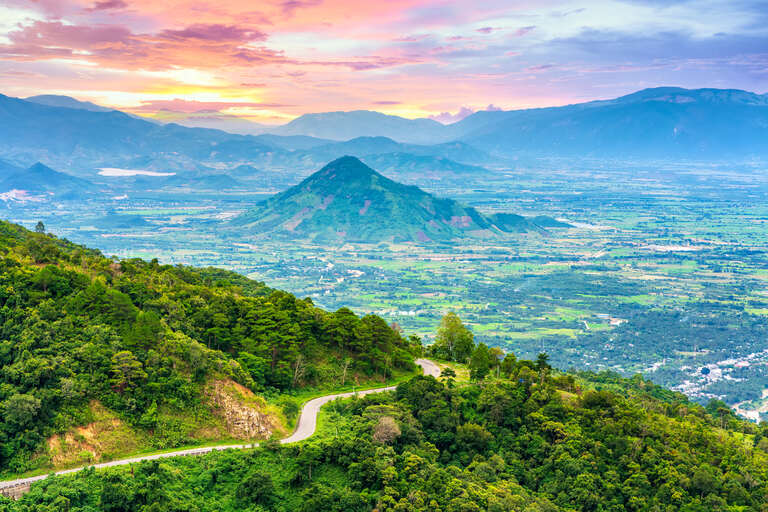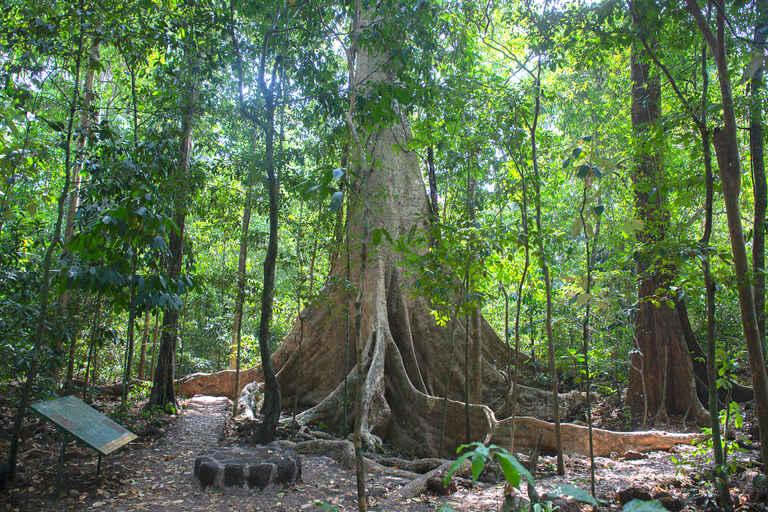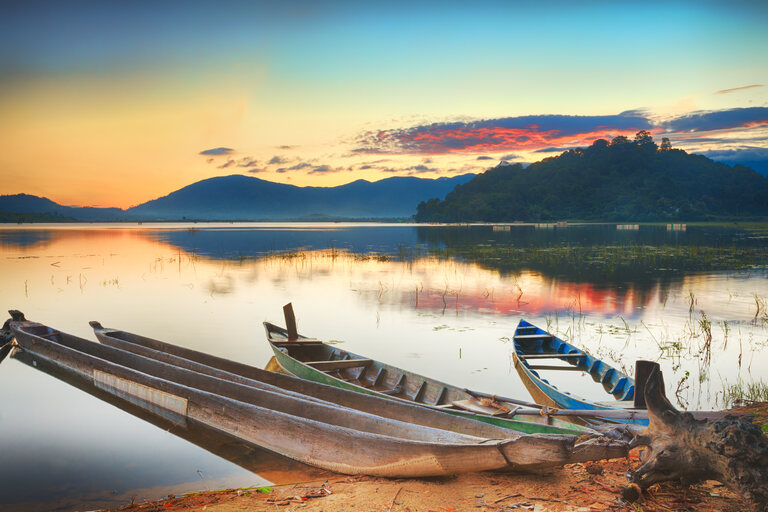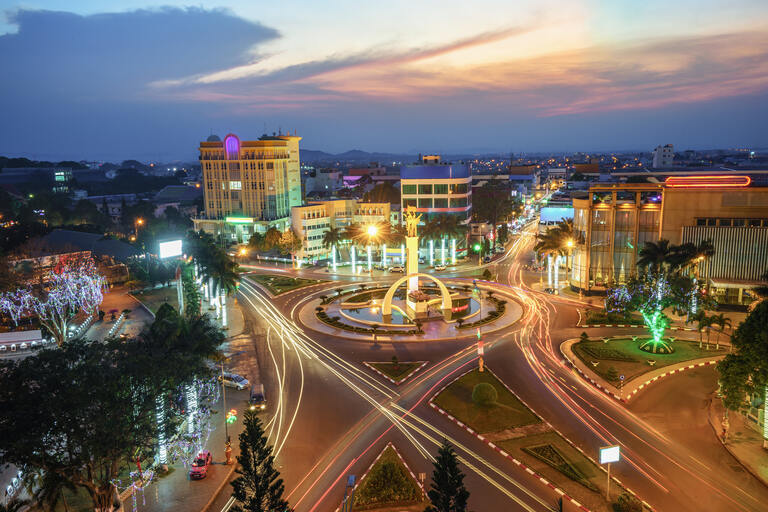Vietnam is a beautiful country in Southeast Asia, and in recent years, it has become one of the most popular vacation destinations in the world. It is a land filled with elements of immense natural beauty, impressive cultural attractions, prominent historical landmarks and much more. Decades after the end of colonial rule and internal conflicts, the country has recovered and developed brilliantly, all while honouring its unique culture, traditions and history. Vietnam boasts a plethora of fun and interesting things that draw in massive tourist crowds around the year. From the tropical beach sites, where white sand and turquoise water create alluring visual delights, to all the way up to the lively streets and towering skyscrapers of Ho Chi Minh City, the diversity of its tourist attractions has earned a lot of praise from international visitors. Besides just sightseeing, individuals can also indulge in a number of thrilling adventures and fun activities during their stay in Vietnam tour packages. Some examples include kayaking in the Saigon River, hiking through Cat Ba Island, snorkelling in Cham Island, food tours in Hanoi City, spa treatment in HCMC, etc. Getting these types of distinct experiences in a country at a pocket-friendly rate is every backpacker’s dream. Planning for a Vietnam trip? Well, you are at the right place as we are offering 35 Vietnam tour packages at ranging from 4N/5D to 13N/14D at affordable prices. Explore many itineraries and select the one that best satisfies your expectations for your Vietnam vacation. Thomas Cook also provides the best offers for your Vietnam trip to discover more than anyone else! Don’t forget to add excursions to your selected Vietnam packages.
Vietnam Tour
In spite of its turbulent history, Vietnam tourism has rebounded to become a major vacation destination in South-East Asia. From gorgeous golden paddy fields and white-sand beaches to venerated pagodas and limestone islands dotting the sea, from the labyrinthine cave networks to the rugged mountains, Vietnam’s varied landscapes and the friendly folk– with their beautiful tribal costumes and traditions will welcome you with open arms and a sense of wonder.
Despite an economic boom, Hanoi, the country's capital, has managed to retain its old-world charm. Its Old Quarter is a veritable feast of delicious food vendors, markets, and winding lanes. Ho Chi Minh City has a more modern vibe, whereas Hoi An, a UNESCO World Heritage Site, has managed to retain its charm despite the influx of tourists.
From Ha Long Bay to the Mekong Delta, via the beaches of Da Nang, Vietnam will stimulate all of your senses and pull you in from all sides with its interesting history, beautiful scenery, delicious food, and lively energy. Vietnam trip is like taking a trip you've never been on before; the unique experiences, the varied geography and the mouth-watering food, all of these combined, give us something worth remembering.
Table of Contents
Most Popular Vietnam Tour Packages 2024
| Tour Packages Name | Duration | Price |
|---|
| Stunning Vietnam | 4 Nights 5 Days | Rs. 32 300 |
| Joyful Vietnam | 5 Nights 6 Days | Rs. 42 800 |
| Vietnam Surprise | 6 Nights 7 Days | Rs. 44 100 |
| Vibrant Vietnam | 6 Nights 7 Days | Rs. 101 300 |
| Vibrant Vietnam With Da Nang | 8 Nights 9 Days | Rs. 136 400 |
About Vietnam
Vietnam, officially the Socialist Republic of Vietnam, is a South-East Asian country. It is located on the eastern edge of continental South-East Asia with Hanoi as its capital city.
It is a highly populated country with a population of approximately 99 million. Vietnam shares land boundaries with China to the North, Laos, and Cambodia to the West, and shares sea borders with the Philippines, Indonesia, and Malaysia via the South China Sea and with Thailand via the Gulf of Thailand.
Vietnam has a coastline that stretches for 3,444 km or 2,140 miles, not including the numerous islands. Spread over 311,699 square kilometers, Vietnam is around the same size as New Mexico in the United States and about half the size of France.
The distance between India and Vietnam is around 3194 km (1,985 miles), and the flight time is approximately 4 hours. Hanoi is the country’s capital city, and Ho Chi Minh City is its largest metropolis. However, despite the growth of cities like Ho Chi Minh City and Hanoi, only 36% of the population lives in the country's metropolitan areas. The Red River Delta in the north of the country and the Mekong Delta and Ho Chi Minh City in the south are home to the bulk of the population.
Vietnam Culture
The culture of Vietnam is believed to be one of the world’s oldest cultures, which has experienced massive changes throughout the span of thousands of years. As parts of northern Vietnam were under Chinese rule for some years, its influences are quite evident in the country’s culture and traditions. After its independence, the local rulers went on to conquer parts of the Khmer regime, from where the Cambodian influence surged into Vietnam’s art, music, cuisine and culture in general. The region also absorbed aspects of European culture, especially with the adoption of the Latin alphabet, religion (Catholicism) and architecture, when it was under French colonial rule. Following the exit of France, Vietnamese culture went through further changes with various influences from European, Asian and American cultures.
While some aspects of Vietnamese culture kept changing over the years, others remained the same. The concept of family and clan are very strong in the culture, where it is valued way over individualism. It is not uncommon to see two or three generations of the family living together in a single household. Weddings are grand occasions in the country and include detailed rituals and ceremonies. Food in Vietnam focuses on fresh and healthy ingredients with the inclusion of various types of meats and locally-grown spices. There are well over fifty distinct ethnic groups in Vietnam and among them, the Kinh (Viet) have the largest numbers, around 85.32%. Every ethnic group has their own traditional costumes, with some examples being the Áo Tứ Thân, Áo Cánh, Áo Giao Lĩnh and the Áo Bà Ba. Religion and religious events play a massive role in Vietnamese culture, and the three major religions in the country are Buddhism, Taoism and Confucianism.
Best Time to Visit in Vietnam
It's easy to become overwhelmed while planning a Vietnam trip. There are so many sites to see (and foods to try) in Vietnam that figuring out the perfect time to visit might make your head spin.
We've all been there, but fret not, let’s look at the best time to visit Vietnam and the best time to avoid it. The climate of Vietnam is a typical tropical monsoon climate, with significant humidity all year round. However, due to variances in latitude and topography, the country is affected by three major weather systems. So, the climate tends to vary significantly from one place to the next. Hence, the ideal time to visit Northern Vietnam differs from the perfect time to visit the country's southern regions.
Temperatures in northern cities like Hanoi and the mountainous region of Sapa can be very mild. In contrast, in the south, in places like Ho Chi Minh City and the Mekong Delta, temperatures are almost always hot and humid. So, in general, to get the best of both the northern and the southern parts of the country, travelling to Vietnam in February, March, and April offers the best possibility of dry weather all across, with temperatures not as high as they are during peak dry season. In a gist:
|
Season
|
Month
|
Weather
|
Temperature
|
Airfare
|
|
Winter
|
Dec, Jan, Feb
|
Cold and Rainy
|
20°C - 26°C
|
High
|
|
Spring
|
Mar, Apr
|
Comfortable (dry sunny days punctuated with cloudy, misty mornings.)
|
20°C - 30°C
|
Moderate
|
|
Summer
|
May, Jun, Jul, Aug
|
Wettest and Hottest weather in Vietnam
|
24°C - 30°C
|
Low
|
|
Autumn
|
Sep, Oct, Nov
|
pleasant breezes, sunny days & cooler temperatures
|
20°C - 25°C
|
High
|
How to Reach Vietnam
Most visitors arrive in Vietnam by air or by bus. However, there are also train connections from China and Mekong riverboat connections from Cambodia. Paperwork at the international airports in Vietnam is often less formal than at the land borders. Overland travel between Cambodia and China is now generally stress-free. It can take a long time to cross the border between Vietnam and Laos.
Best way to
reach Vietnam from India generally prefer to fly into the country by utilising the services of airline carriers that shuttle between India and Vietnam. The distance between India and Vietnam is 3,194 kilometres, and direct flight durations vary between 4 hours to 6 hours depending on the airport in India from where you are taking off.
By Air
Airline carriers like VietJet and Vistara operate non-stop flights from all the major cities in India to the international airports in Vietnam. Indigo airlines have also started non-stop flights from Kolkata to Hanoi. Other carriers also operate direct flights from Delhi and Bangalore to Ho Chi Minh City. The average flight time from New Delhi to Hanoi is 4 hours and 20 minutes. In Vietnam, there are three international airports; depending on which section of the country most interests you, the port of entry can be chosen.
By Sea
Despite not being directly accessible by sea, travellers from India can reach the magnificent country of Vietnam via the waterways that connect Cambodia, China, and Thailand. Indian tourists can reach Vietnam by crossing the Mekong Delta via Cambodia or Thailand.
By Road
Vietnam is only accessible from Laos and Cambodia because the other side of the country faces the sea. You may fly into either of these nations and then take a bus across their borders. However, we propose that you travel from Cambodia because it is much more convenient.
Tourist Places to Visit in Vietnam
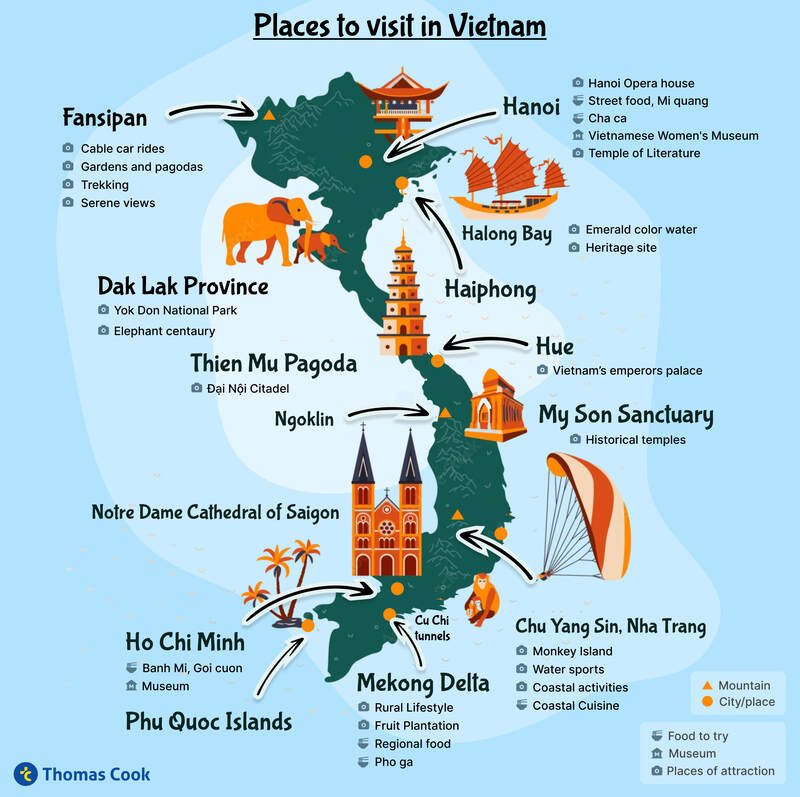 >
>Let us take a look at the main tourist destinations and different places to visit in Vietnam.
- Hanoi
- Northern Vietnam
- Central Vietnam
- The South-Eastern Coast of Vietnam
- The South-West Highlands
Hanoi
Vietnam's capital Hanoi is racing to make up for lost time due to the scars of war and a regime that kept the outside world at bay until the 1990s. Its streets overflowing with scooters competing for the right of way amid a cacophony of screaming horns, and layers of history, reflect eras of French and Chinese occupation all around, revealing the tenacity of the ambitious and proud Hanoians.This is one of the most popular tourist attractions in Vietnam and must be a part of your Vietnam tour packages from India. Some famous places to visit in Hanoi are:
- The Old Quarter
- Vietnam Museum of Ethnology
- Temple of Literature
- Vietnamese Women’s Museum
- Ho Tay Lake
- Long Bien Bridge
- Lotte Tower Observation Deck
Northern Vietnam
This is Vietnam's big-sky country, with undulating mountains, tumbling rice terraces, and the region's famous winnowed-out karst geology. Northern Vietnam's cultural kaleidoscope is just as diverse as its scenery. Villages situated between paddy-field patchworks outside of Sapa, in this heartland of hill-tribe culture, give dazzling color to hectic highland markets. The meandering ribbon roads north of Hanoi depict a pastoral world far apart from Vietnam's horn-blaring big-city streets. This is the place to go if you want to go road-tripping in Vietnam. Some must-see places in Northern Vietnam during your Vietnam trip:
- Halong Bay
- Sapa
- Ba Be National Park
- Cat Ba Island
- Ha Jiang Province
- Bac Ha
- Mai Chau
Central Vietnam
Central Vietnam is the country's geographic center, rich in historical and cultural sites, beautiful beaches, and world-class national parks. A few not-to-be-missed sights here include
- Danang
- Hoi An
- Hue
- Demilitarized
- Zone (DMZ)
- Bach Ma National Park
- Ninh Binh Province
- Phong Nha-Ke Bang National Park
The South-Eastern Coast of Vietnam
This glittering coastline of beautiful white sand, formerly the heartland of the Cham civilization, is now a one-stop destination for Vietnam's best beach vacation resorts. Some unmissable attractions here include
- Long Hai
- Vung Tau
- Phan Thiet
- Mui Ne
- Quy Nhon
- Quang Ngai
- Cha Ban Cham
- Con Dao Islands
The South-West Highlands
The highlands of Vietnam are one of the few places in the country that entice visitors with the promise of adventure. The Ho Chi Minh Highway travels through coffee plantations, pine-studded mountains, rice terraces, massive reed-covered lakes, and quiet hill-tribe settlements. Some major attractions in this part of the country are:
- Cat Tien National Park
- Dalat
- Kon Tum
- Lak Lake
- Buon Ma Thuot
- Ngoan Muc Pass
The Best Hill Stations in Vietnam:
Below are the most visited hill stations in Vietnam during your Vietnam tours:
- Dalat
- Ngoan Muc Pass
- Cat Tien National Park
- Lak Lake
- Buon Ma Thuot
Dalat
Dalat is Vietnam's alter ego—the weather is cold rather than tropically hot (as is true in the case of a hill station), and the town is filled with lovely French-colonial homes rather than the glass and concrete structures of the big cities, and the surrounding farms are lush with strawberries and flowers rather than rice.
Ngoan Muc Pass
The breathtaking Ngoan Muc Pass is located 43 kilometers south of Dalat. On a clear day, the ocean, which is 55 kilometers away, can be seen from here. The roadway winds its way down the mountain, passing beneath two massive water pipes that connect the lake to the hydroelectric power facility at the pass's foot.
Cat Tien National Park
It consists of an incredibly bio-diverse lowland tropical rainforest. The 72,000-hectare park is one of Vietnam's most astonishing natural assets and is known for hiking, mountain biking, and birdwatching.
Lak Lake
Popularly called Ho Lak, this natural body of water in the central highlands is surrounded by idyllic rural surroundings.
Buon Ma Thuot
This hilly region produces some of Vietnam's greatest coffee, marketed and consumed in plenty throughout town. In March, Buon Ma Thuot has an annual Coffee Festival, during which gallons of the elixir get consumed.
Best beaches in Vietnam
The beaches are one of the highlights of a Vietnam tour package. Here are the most popular beaches in Vietnam to explore.
1. Con Dao Islands: Finding gorgeous beaches, snorkeling coral reefs, and riding motorcycles along empty coastal roads are what Con Dao is all about.
2. Ho Tram/Ho Coc: Going on a long drive between Phan Thiet and Long Hai, passing by a magnificent lighthouse and limitless sands, makes these beaches a highlight of touring in Vietnam.
3. Tam Hai Island: Searching for driftwood on white-sand beaches and looking for a whale graveyard are some of the offbeat activities that this stretch of sandy paradise is known for.
4. Nha Trang: In this brash town, soak in the unique beach atmosphere or go boating to the offshore islands.
5. Vung Tau: A seaside paradise is quintessentially known for its surf, fresh seafood, and gastronomic variety.
Honeymoon in Vietnam
The lovers’ paradise in Vietnam, Dalat is a town that is known best destination for honeymoon in Vietnam. As with everything romantic, the French were the first to arrive on the scene, fleeing the sweltering heat of Saigon (Now, Ho Chi Minh City). They left their vacation houses and the atmosphere of a European town behind. The Vietnamese couldn't help enhance Dalat's inherent beauty by adding a few finishing touches to the romantic portrait painted by the French arrivals. Whether it's the Eiffel Tower-shaped radio tower, horse-drawn carriages, or the Valley of Love's obsessively colorful heart-shaped cut-outs, this town takes romance seriously. Dalat is a popular destination for domestic visitors.
It's a combination of Le Petit Paris, the honeymoon capital, and the City of Eternal Spring (daytime temperatures range from 15°C to 24°C). For visitors, the mild climate makes it an ideal location for various adrenaline-pumping sports. A few unmissable spots for honeymoon in Vietnam include:
- King Palace
- Hang Nga Crazy House
- Cremaillere Railway Station
- Xuan Huong Lake
- Linh Quang Pagoda
- Truc Lam Pagoda and Cable Car
- Elephant Falls
Best Places to Visit in Vietnam
A Vietnam trip is incomplete without visiting these beautiful places:
- Hanoi
- Halong Bay
- Haiphong
- Ba Be National Park
- Dalat
- Dien Bien Phu
- Sapa
- Lao Cai
- Hue
- DMZ
- Quang Ngai
- Nha Trang
- Danang
- Lak Lake
The local flavors and historical gems of Central Vietnam, the empty coastlines and ancient temples of the South-East Coast, the lovelorn artistic towns and the adventure-filled national parks of the South-West Highlands, the urban tours and night-life of Ho Chi Minh City, the white sands and the floating markets of the Mekong Delta, all of these destinations have something for visitors of all age groups. Vietnam never ceases to amaze people with the variety of destinations and experiences it has to offer.
Foods to Eat in Vietnam
The cuisine in Vietnam is as diverse as the rich highlands, flooded rice paddies, forested mountains, and the sandy coasts. While a long history of contact with outsiders adds complexity, locals have adapted the Chinese, Indian, French, and Japanese techniques and specialities to suit their own palates over the ages. The incredible array of excellent delicacies available in the country encourages one to experiment. Though the well-known Vietnamese classics – pho, spring rolls, and shrimp paste barbecued on sugar cane – are all delicious, it's worth venturing into the backstreets and markets to eat with the locals, as here is where you'll typically find the most authentic food.
Being an Indian traveler though, one might wonder about the dining options available in a primarily carnivorous country. The good news is that when it comes to vegetarian dining, there are now more options than ever before. The bad news is that you haven't arrived in Vegetarian Heaven, as the Vietnamese are omnivorous eaters. They appreciate vegetables, but they also adore everything from insects to sea dwellers to air-borne critters. Vegetarian (com chay) restaurants may be found in most towns, mainly around Buddhist temples. These are frequently small, basic places frequented by devout Buddhists. Many people use 'mock meat’, tofu, and gluten to make meat-like recipes that are surprisingly tasty. Many vendors and diners follow Buddhist precepts by becoming vegetarian on the first and 15th day of each lunar month. This is an excellent opportunity to visit the marketplaces and try dishes that would otherwise be prohibited.
Vietnam offers a diverse range of dining and drinking options. Fresh and vibrant flavours, superb street food, and fine-dining restaurants that are housed in renovated colonial structures allow visitors to sample the country's unrivalled culinary offerings. If one wants to uncover the culinary past of Vietnam, one can do so by joining cooking workshops, market visits, and strolling tours, often curated by the locals.
Some of the dishes to try when traveling to Vietnam
- Banh Cuon: Originating from Northern Vietnam, these Vietnamese Steamed Rice Rolls are made with thin steamed rice batter sheets filled with ground pork and minced wood ear mushrooms.
- Bun Cha: A grilled pork and noodle Vietnamese meal claimed to have originated in Hanoi, Vietnam. Bun cha is a dish that consists of grilled fatty pork (cha) over a bed of white rice noodles (bun) and herbs, with a dipping sauce on the side.
- Pho Bo: Soft slippery noodles in a substantial, meaty yet fragrant broth make up a bowl of beef pho.
- Banh Khoai: Rice-flour batter is used to make these hefty, dessert-plate-sized crepes, which are then fried in special long-handled pans with oil. They're filled with shrimp, pork, egg, and bean sprouts, then wrapped in lettuce with fresh herbs and dunked in a sauce made from earthy fermented soybeans.
- Bun Bo Hue: A Vietnamese meal that originated in Hue. Hue beef noodle soup is the name of the dish, although it also contains pork. The broth in this dish is created from beef and pork bones.
Best Indian Restaurants in Vietnam
Vietnamese cuisine is heavily inspired by Indian flavours and cuisines, making Indian cuisine extremely popular among locals. Indian restaurants may be found in every nook and cranny of the country's major cities. There are simply too many Indian eateries in Vietnam for an Indian traveller to be far from sapid Indian flavours if hunger strikes unexpectedly.
- Dalcheeni, Hanoi: This is without a doubt one of the best Indian restaurants in Hanoi, Vietnam. The restaurant offers a huge selection of Indian meals, particularly vegetarian alternatives, making it a haven for Indian vegetarian food lovers in Vietnam. The environment is colourful, and the interior decorations are enticing, making it one of Vietnam's greatest Indian restaurants.
Located at: 100 Xuan Dieu, Quang An, Tay Ho, Qung An Tay Ho Hanoi 100000, Vietnam
- Shri Natraj Indian Cuisine, Ho Chi Minh City: This venue will make you fall in love with its vibrant, highly lit, and very warm friendly ambience. Shri Natraj is owned and operated by an Indian man named Rahul, who is extremely friendly, pleasant, and hospitable to tourists. The lavish food is really amazing and pure authentic Indian, and Rahul has done his best to maintain the interiors appealing with a nice Indian touch.
Located at: 41 Bui Thi Xuan, Phuong Pham Ngu Lao, Quan 1, Ho Chi Minh
- Namaste India, Ho Chi Minh City: In the centre of Bui Vien Boulevard, a wonderful and pleasant fine dining Indian restaurant. Its delectable delights will have just the appropriate quantity of spices and oil to make you feel like you're eating something homemade. Pakoras are wonderful appetisers that are hot, spicy and served with aromatic chutneys. Weekends in this city are vivid and colourful, and there is typically a live band performing fantastic music.
Located at: 189 Bui Vien, Phuong Pham Ngu Lao, Quan 1, Ho Chi Minh City
- Namaste Ha Noi: This is without a doubt one of the top Indian restaurants in Hanoi. Amazingly lovely environment with fascinating décor, delivering superb authentic Indian cuisine. The restaurant's extensive menu, which includes cuisines from both North and South India, will make you ponder your options. Mr Gopi, the owner, is Indian, and he will frequently come down to your table to make your dining experience as pleasant as possible.
Located at: 46 Tho Nhuom, Tran Hung Dao, Hoan Kiem, Hanoi
- Bollywood Indian Cuisine: This is a no-frills eatery with lightning-fast service and shockingly low prices. One of the top places in the Sky Garden neighbourhood for north and south Indian cuisines, this restaurant delivers fresh, flavorful Indian foods. This restaurant specialises in delectable Indian cuisine. Bollywood Indian Cuisine is extremely cost-effective.
Located at: SA 26-2, Sky Garden 2, Quan 7, Vietnam
Things to Do in Vietnam
Here are the top 5 things to do in Vietnam during Vietnam tours.
- Cave trips: Hang Toi (Dark Cave) and the subterranean treasures of Hang Va are accessible via an exhilarating zipline, swimming, and kayaking combo.
- A visit to the Lotte Tower, Hanoi: The observation deck of this beautiful new monument, which also houses a plethora of cafes and restaurants, is the greatest site to evaluate Hanoi's growth in relation to the Old Quarter.
- Experience the cafe scene at Con Dao: New establishments such as Bar200 Con Dao and Infinity Cafe & Lounge have breathed new life into quiet ancient Con Son town.
- Visit a local brewery: Traveling hopheads will find additional local brews at BiaCraft in Saigon's developing District 2 neighbourhood, while Pasteur Street Brewing Company blends local ingredients like lemongrass and Dalat coffee.
- Vespa Adventures: There's no better way to explore the rural lanes, craft villages, and riverfront landscapes near Hoi An, than on the back of a vintage scooter. Rental agencies provide package deals on the zipping two-wheelers too.
Adventurous Things to Do in Vietnam
Though Vietnam took a long time to realise its enormous potential as an outdoor adventure destination, things have changed dramatically in recent years. Apart from trekking in the hilly north, visitors can now engage in activities such as rock climbing, canyoning, sea kayaking, and kitesurfing. Although some activities, such as mountain biking, may be done throughout the country, Da Lat has emerged as Vietnam's adventure sports centre and Mui Ne as its surf city. The northwest highlands of Sa Pa and, to a lesser extent, Mai Chau, are the simplest and most popular trekking destinations. Sa Pa is also the starting point for ascents of Fan Si Pan, the country's highest peak, which should only be attempted by experienced hikers.
In Vietnam, mountain biking is another activity which is growing increasingly popular. The most popular route is from Hanoi to Ho Chi Minh City, which takes two to three weeks. Previously, this would have meant battling trucks and buses along Highway 1, but now, the most forward-thinking tour operators are arranging excursions down the Ho Chi Minh Highway, which travels along the western Truong Son mountain chain and is pleasantly free of traffic.
For people with an affinity for water, Vietnam's three thousand kilometre coastline should make it a watersports paradise, but the alternatives are now limited for a variety of reasons. One is simply an issue of access: the necessary infrastructure is lacking. The existence of potentially dangerous undercurrents along much of the coast, along with strong winds at certain times of the year, is even more critical. During the summer, many of the major beach resorts employ lifeguards or place flags indicating where it is safe to swim. If you're going somewhere else, double-check before you go.
Interesting Facts about Vietnam
- Vietnam is the top exporter of black pepper in the world.
- Vietnam's coastline stretches for almost 2,000 miles.
- Vietnam is home to roughly 16% of the world's species, indicating a high level of biodiversity
- Vietnam is the world's largest cashew nut exporter
- Fansipan is the tallest mountain in Vietnam, and indeed all of Indochina. It is known as "the roof of Indochina" because of its height of 3,143 metres
- In Vietnamese culture, the turtle is a significant emblem. The turtle is said to represent intellect, strength, and longevity, and Vietnamese people associate it with wins and independence following invasions at various points in history
- Hanoi: Visit the shops along P Hang Gai, P To Tich, P Hang Khai, and P Cau Go for Vietnamese handicrafts like textiles and lacquerware. Embroidered tablecloths, T-shirts, and wall hangings can be found in P Hang Gai and its continuation, P Hang Bong. P Hang Gai is also a great destination to get silk and custom-made clothing.
Clothing, cosmetics, imitation sunglasses, bootleg DVDs and software, T-shirts, musical instruments, plumbing supplies, herbal treatments, jewellery, religious offerings, spices, coffee, and much more can be found in the ancient Old Quarter. Assume that practically all of the branded items you encounter are counterfeit.
- Mekong Delta: The night market in Duong Dong and the pearl farm in Long Beach's center are your best bets for souvenirs. Phu Quoc Pearls is a must-visit if you're looking for black, yellow, white, pink, or any other color of pearls. Various pieces of jewellery produced from the pearls are on display. Although avid pearl searchers can discover cheaper products in the village of Ham Ninh's kiosks, you can be certain of authenticity here.
- Ho Chi Minh City: Tourists are aggressively sold junk on the city's crowded streets, but there are lots of fantastic buys at bustling markets, antique stores, silk boutiques, and speciality shops selling ceramics, ethnic fabrics, lacquered bamboo, and custom-made apparel. Any shopping trip should begin on Dong Khoi and its intersecting streets, which are lined with galleries and boutiques and offer high-quality handicrafts and souvenirs. Ben Thanh and its neighboring streets are one of Saigon's liveliest neighborhoods due to its central location. Everything that the Saigonese eat, wear, or use is stacked high, and souvenir items are plentiful. Vendors are determined, and prices are normally higher than elsewhere, so haggle hard and ignore any signs that say "Fixed Price."
- Kon Tum Highlands: Kon Tum and the surrounding villages are ideal places to shop if you collect indigenous handicrafts. Although some items are cheaper in the villages, Kon Tum has a superior overall range.
- Buon Ma Thuot: Stock up on coffee here because it is cheaper and of greater quality here than in Ho Chi Minh City or Hanoi. Before you buy, have a look at the coffee shop strip on Ly Thuong Kiet.
- Nha Trang: In the blocks near the corner of Tran Quang Khai and Hung Vuong in Nha Trang, there are some good arts and crafts shops. Nguyen Thi Minh Khai is lined with fashion businesses selling anything from sling bags to sunglasses.
Best Places to Stay in Vietnam
In general, the quality of lodging in Vietnam is great. The range caters to all budgets in the main tourist locations, and while prices are a little high by Southeast Asian standards, the quality is generally also high. With the construction boom still going on, new rooms are being built all the time, which is fantastic for travelers because it keeps costs down and service standards high. Along the coast, there has been major growth in the number of luxury resorts (mostly oriented at the Asian package tour industry), although budget travelers and those travelling off the beaten path will find good cheap lodging all across the country.
Staff at tourist information booths in Ho Chi Minh City and Hanoi will call to reserve a room for you, and booking online is becoming more convenient. When asking cyclo or taxi drivers for recommendations, be wary of being informed that the hotel of your choice is full or closed. It's also worth noting that Vietnam is rife with imitators; to prevent being transported to a hotel with a similar name, write down the street name and show it to your driver. When you've chosen a hotel, have a look at a few different rooms before deciding, as standards might vary greatly even within the same business. You should also double-check the bed configuration, as there are numerous variations throughout Vietnam. A "single" room may contain a single or twin bed, whereas a "double" room may contain two, three, or four single beds, a double, a single and a double, and so on. Check out for hotels in different categories and different budgets.
Visa Process for Indians
Indian passport holders considering a vacation to Vietnam must apply for a visa for the duration of their stay in the country. Yes, Indian passport holders are required to obtain a visa in order to enter the nation. However, it is now easier than ever for Indian citizens to obtain a Vietnam visa, thanks to online applications for visas on arrival. Indians visiting Vietnam can acquire their visa on arrival at one of the country's participating international airports, Ha Noi, Da Nang, Ho Chi Minh City, and Nha Trang. To apply for a visa to visit Vietnam, you must submit the following papers:
- Passport from India, valid for at least six months beyond the date of travel to Vietnam. For the visa stamp, you'll need at least two blank pages in your passport.
- Two passport-sized photos.
Currency in Vietnam
The official currency of Vietnam is the Vietnamese Dong. One Vietnamese Dong equals 0.0034 INR (as of 1st Jan 2024). Before you travel to Vietnam, make sure you purchase enough Dong to last you the entire duration of the Vietnam trip. Thomas Cook makes it easy for you to buy Forex online by just in one click.
It is suggested that you buy forex in the form of a multi-currency card which can be used all across Vietnam as most of the establishments accept digital forms of payment, even the small mom and pop stores. However, the saying that “Cash is King” cannot be ignored completely and hence, it is advisable to keep a certain amount of Dong in cash as well, mostly in the form of small change, for use in cases of emergency.
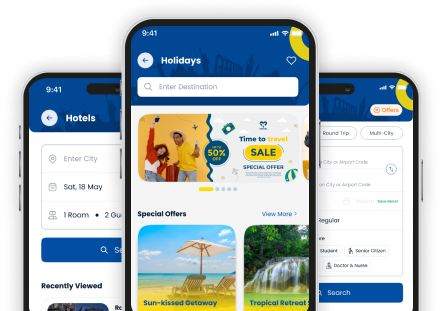





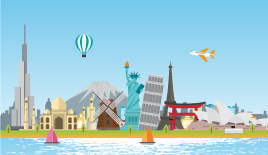
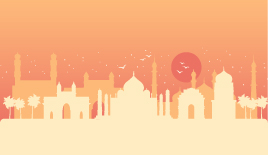







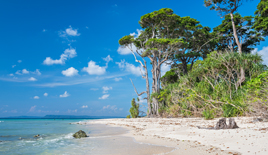

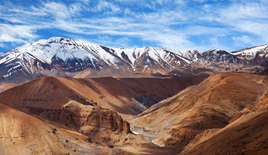
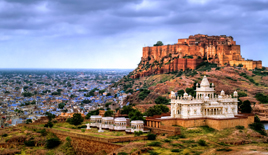



 >
>